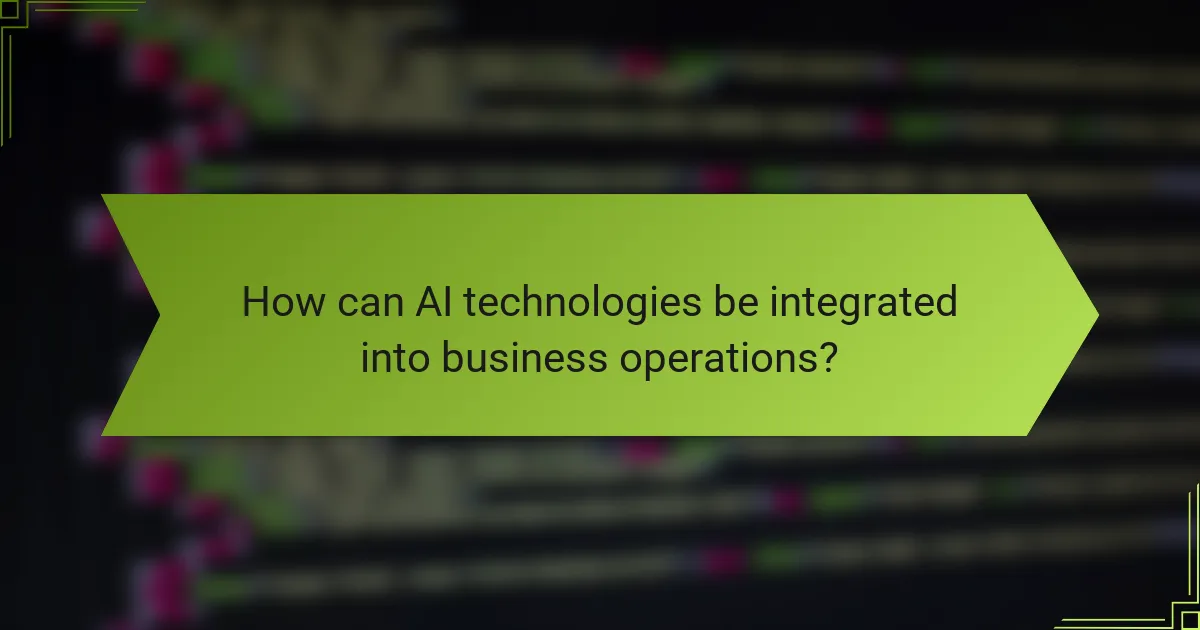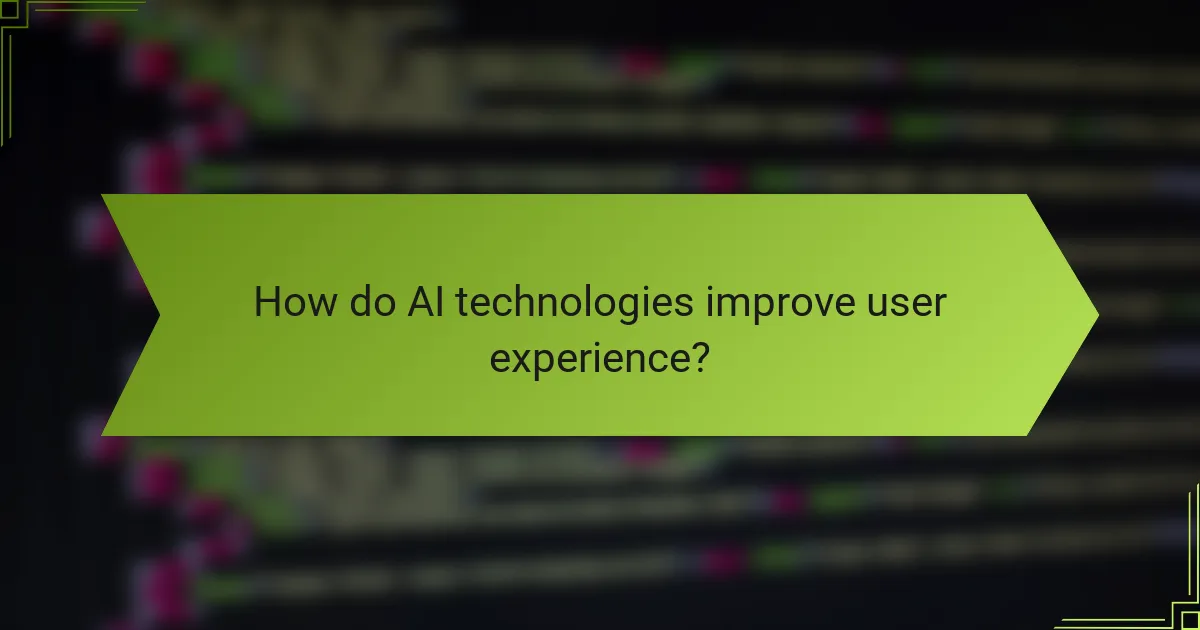AI technologies are revolutionizing business operations by seamlessly integrating into existing workflows, enhancing software capabilities, and leveraging cloud solutions. This integration not only automates processes and improves decision-making but also significantly enhances customer experiences. By offering increased efficiency and tailored interactions, AI fosters better engagement and satisfaction, ultimately driving growth and competitiveness for businesses.

How can AI technologies be integrated into business operations?
AI technologies can be integrated into business operations by embedding them into existing workflows, enhancing software capabilities, and utilizing cloud solutions. This integration allows businesses to automate processes, improve decision-making, and enhance customer experiences.
Integration with existing software
Integrating AI with existing software involves assessing current systems and identifying areas where AI can add value. For example, customer relationship management (CRM) systems can be enhanced with AI-driven analytics to provide insights into customer behavior.
Consider using AI tools that are compatible with your current software to minimize disruption. Ensure that your team is trained on these tools to maximize their effectiveness and avoid common pitfalls such as underutilization.
Cloud-based AI solutions
Cloud-based AI solutions offer scalability and flexibility, allowing businesses to access advanced AI capabilities without heavy upfront investments. These solutions can be deployed quickly and adjusted according to changing business needs.
When selecting a cloud-based AI provider, evaluate factors such as data security, compliance with local regulations, and integration capabilities with your existing systems. Popular options include platforms like AWS, Google Cloud, and Microsoft Azure.
API utilization for seamless integration
Utilizing APIs (Application Programming Interfaces) is crucial for seamless integration of AI technologies into business operations. APIs allow different software applications to communicate, enabling the incorporation of AI functionalities into existing systems.
When implementing APIs, ensure they are well-documented and supported by the provider. Prioritize APIs that offer robust security features and consider the potential need for custom development to tailor the integration to your specific business requirements.

What are the benefits of AI technologies for businesses?
AI technologies offer numerous advantages for businesses, including increased efficiency, improved data analysis, and enhanced customer engagement. These benefits can lead to significant cost savings and better decision-making, ultimately driving growth and competitiveness.
Increased operational efficiency
AI technologies streamline processes by automating repetitive tasks, which reduces the time and effort required for operations. For instance, chatbots can handle customer inquiries, allowing human agents to focus on more complex issues.
Businesses can implement AI-driven tools to optimize supply chain management, inventory control, and production scheduling. This can lead to lower operational costs and faster turnaround times, enhancing overall productivity.
Enhanced data analysis capabilities
AI systems can analyze vast amounts of data quickly and accurately, uncovering patterns and insights that may not be visible through traditional methods. This capability allows businesses to make data-driven decisions based on real-time information.
For example, predictive analytics can help companies forecast sales trends, enabling better inventory management and marketing strategies. Utilizing AI for data analysis can improve accuracy and reduce the risk of human error.
Improved customer engagement
AI technologies enhance customer engagement by personalizing interactions and providing timely responses. Businesses can use AI to analyze customer behavior and preferences, tailoring marketing efforts to individual needs.
For instance, recommendation engines on e-commerce platforms suggest products based on past purchases, increasing the likelihood of sales. Additionally, AI-driven customer service solutions can provide 24/7 support, improving customer satisfaction and loyalty.

How do AI technologies improve user experience?
AI technologies enhance user experience by providing tailored interactions and efficient service. These advancements lead to more relevant content, quicker responses, and overall increased satisfaction for users.
Personalized recommendations
Personalized recommendations utilize AI algorithms to analyze user behavior and preferences, delivering content that aligns with individual interests. For instance, streaming services like Netflix and e-commerce platforms such as Amazon use these systems to suggest movies or products based on past interactions.
To implement personalized recommendations effectively, businesses should focus on collecting quality data and continuously refining their algorithms. This ensures that suggestions remain relevant and engaging, ultimately improving user retention and satisfaction.
24/7 customer support through chatbots
AI-powered chatbots provide round-the-clock customer support, addressing queries and resolving issues without human intervention. These bots can handle a variety of tasks, from answering frequently asked questions to assisting with order tracking, significantly reducing wait times for users.
When deploying chatbots, it is crucial to ensure they are well-trained and capable of understanding natural language. Regular updates and user feedback can help improve their performance, making interactions smoother and more effective for customers.

What are the key considerations for choosing AI technologies?
When selecting AI technologies, it’s essential to evaluate factors such as scalability, cost-effectiveness, and the specific needs of your organization. These considerations will help ensure that the chosen solution aligns with your long-term goals and operational requirements.
Scalability of solutions
Scalability refers to the ability of an AI solution to grow and adapt as your business needs change. A scalable AI system can handle increased workloads without a significant drop in performance, which is crucial for businesses expecting growth or fluctuating demands.
When assessing scalability, consider whether the technology can integrate with existing systems and how easily it can be expanded. For instance, cloud-based AI solutions often provide more flexibility in scaling compared to on-premises systems, allowing businesses to adjust resources based on demand.
Cost-effectiveness
Cost-effectiveness is a critical factor when choosing AI technologies, as it directly impacts your return on investment. Evaluate both the initial costs and ongoing expenses, such as maintenance and updates, to determine the overall financial impact.
To ensure cost-effectiveness, compare different solutions and consider their pricing models. Some AI technologies may offer subscription-based pricing, while others might require a significant upfront investment. Additionally, look for solutions that provide clear metrics for measuring performance and efficiency, helping you justify the costs over time.

What are the challenges of implementing AI technologies?
Implementing AI technologies presents several challenges, including data privacy concerns and integration complexity. Organizations must navigate these issues to successfully leverage AI’s potential while ensuring compliance and operational efficiency.
Data privacy concerns
Data privacy is a significant challenge when implementing AI technologies, as these systems often require large amounts of personal data to function effectively. Organizations must adhere to regulations such as the General Data Protection Regulation (GDPR) in Europe or the California Consumer Privacy Act (CCPA) in the U.S., which impose strict guidelines on data collection and usage.
To mitigate privacy risks, companies should implement strong data governance policies, including data anonymization techniques and robust consent management processes. Regular audits and assessments can help ensure compliance and build trust with users.
Integration complexity
Integrating AI technologies into existing systems can be complex and resource-intensive. Organizations must consider compatibility with current infrastructure, data formats, and workflows, which may require significant adjustments or even complete overhauls of legacy systems.
To simplify integration, businesses should adopt a phased approach, starting with pilot projects that allow for testing and refinement before full-scale implementation. Collaborating with experienced AI vendors can also help streamline the process and reduce potential pitfalls.

How is AI technology evolving in major cities?
AI technology is rapidly evolving in major cities, driven by advancements in machine learning, data analytics, and urban infrastructure integration. Cities are increasingly leveraging AI to enhance public services, improve transportation systems, and optimize resource management.
Adoption trends in New York
In New York, AI adoption is becoming prominent across various sectors, including healthcare, finance, and public safety. For instance, hospitals are utilizing AI for predictive analytics to improve patient outcomes, while financial institutions are employing AI algorithms for fraud detection and risk assessment.
Additionally, the city is implementing AI-driven traffic management systems to reduce congestion and enhance public transportation efficiency. These systems analyze real-time data to optimize traffic signals and provide better routing for buses and emergency vehicles.
However, challenges remain, such as ensuring data privacy and addressing potential biases in AI algorithms. Stakeholders must navigate these issues while fostering innovation and maintaining public trust in AI technologies.
